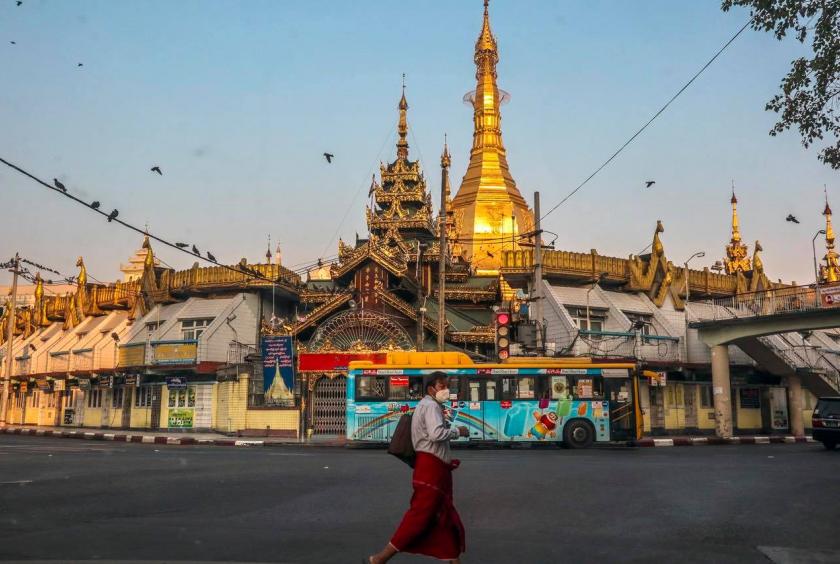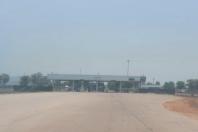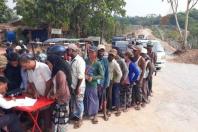YANGON – All-round economic instability following Feb 1 military takeover have severely undermined business confidence and job prospects, according to local businesses.
The political instability as well as Covid-19 pandemic have an immediate impact on value of the Kyat which has fallen by about 20 per cent against the US dollar, while basic foodstuff has witnessed 10-15 per cent price increases. Cost of fuel has also risen by about 30 per cent.
Shop owners aren't stocking goods at the level they normally do. They just buy what they need now. They also are very selective, only stocking up the most of essentials," said Ko Pho Hla from Ko Pho Hla pharmacy in Mingalar Market.
The situation is hitting the low income group hardest – already among the poorest in Asean.
Livelihood and Food Security Fund (LIFT), an organisation under United Nations Office for Project Services, warned that families already staggering from the impact of COVID-19 will only become worse, plummeting to poverty, starving as food prices skyrocket pass their reach and healthcare services too expensive to procure.
World Food Programme has estimated that 4.5 million people are going hungry.
Yangon, usually seen as the most prosperous of cities, is seeing a drastic income cut for its residents.
Factories that provided jobs for many lower income families are also facing a number of challenges with lower orders while the supply chains subject to gridlock. A number of factories are running into insolvency as cashflows dry up.
A number of workers from many factories have been laid off, concentrated particularly on female migrant workers. Many migrant workers are leaving Yangon to return home.
Even those with regular incomes are facing difficulties withdrawing money frm banks as many bank branches remain closed and restrictions on how much cash each depositor can withdraw remain.
This banking situation has led to a creation of a black market for Kyat with people who could not wait to get cash withdrawal from banks go to cash out from people who have ample cash and pay commission. The rate is said to be between 5-7 per cent.
"Since it's a situation where there is no other choice, I paid 7 percent. So that's Ks7000 for Ks100,000 withdrawal," said someone cashed out Ks7 million.
The opportunists have been criticized for piling further misery on the people. "I understand the need for some fee but this is too much. They should some sympathy," said a person on the ATM queue.
Private banks have attempted to stymie the hordes of withdrawers by limiting the amount of cash that could be withdrawn, as well as introducing a token/appointment system at certain branches.
Central Bank has also been trying to ease the right foreign exchange market by auctioning off US$12 million at an average exchange rate of Ks1650.6 per US on dollar on May 12-13.
This did have some effect, albeit temporary, as a US dollar-Kyat was appreciated from Ks1710 Kyat on May 11 to 1645 Kyat on May 13.
The fall in the value of the Kyat has led to increase in the prices of imported goods especially medicine, fuel, communication equipment.
"Locally produced goods such as rice, oil, salt, chili, onions and potatoes have risen somewhat. Maybe oil a little bit but imported goods are on the rise like kitchen items from Thailand. said a grocery store owner from Tamwe Township.
"Imported medicine cost more now. Mask prices are the same. It is the case when dollar and gold prices rise. Companies are also selling higher. Some transportation routes are blocked but products are still coming in, but prices are only going up. It's not artificially inflated but just the demand and supply," said Ko Pho Hla from Ko Pho Hla pharmacy in Mingalar Market.
"The usual 2-liter bottle we buy cost around Ks5600 in the fourth week of January. Now it is at Ks7500. Coffee mixes cost more. Even some local made items cost more now, " said a housewife from Thingangyun.
Transportation upheavals have also played into the business difficulties with some cargo service charges rising by as much as 40-50 per cent. Much of which can be attributed to rising fuel prices.
According to the Ministry of Commerce and Trade, Myanmar imports around 200,000 to 400,000 tonnes of fuel per month with import coming from refineries in Singapore. Fuel price has risen by about 33 per cent since Feb 1.
According to the Myanmar Petroleum Trade Association, the cheapest 92 Ron was at Ks620 per litre in February. On May 14, it was Ks1005.
Myanmar imports annually around 6 million tonnes of fuel. But volume has fallen by about 1 million tonnes in the first seven months of the fiscal year as demand plunged.











